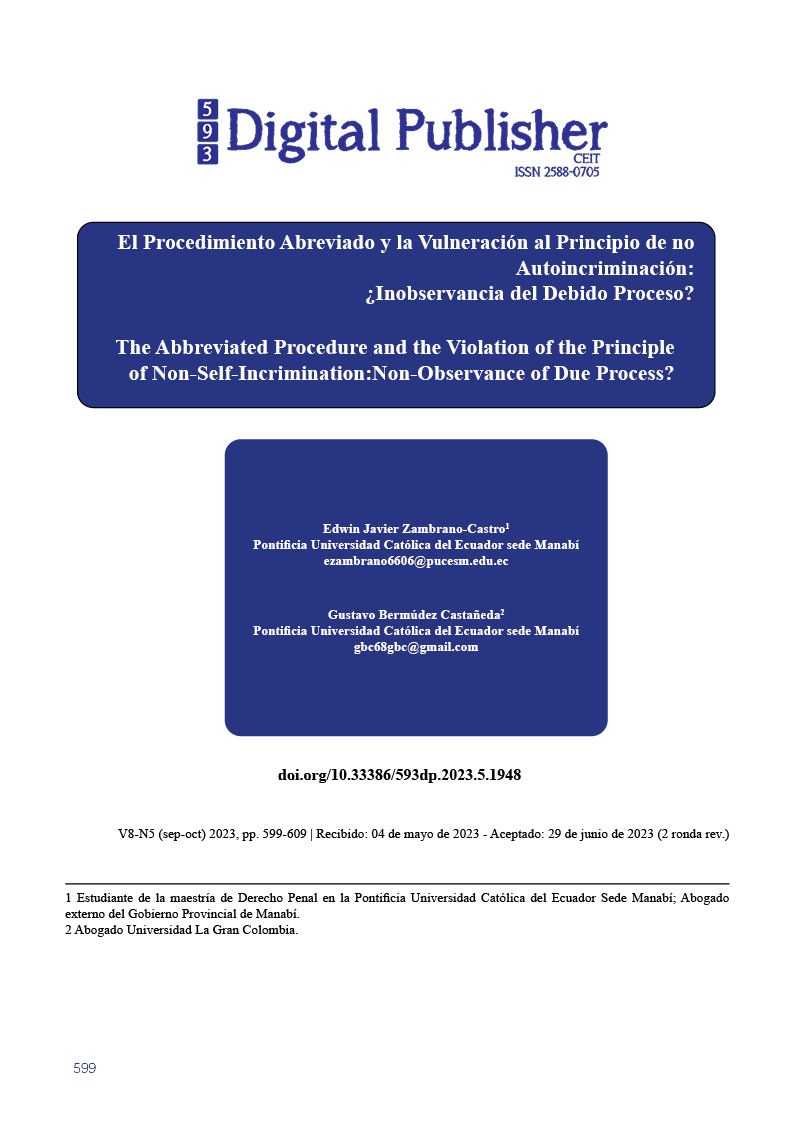The Abbreviated Procedure and the Violation of the Principle of Non-Self-Incrimination:Non-Observance of Due Process?
Main Article Content
Abstract
The work aims to examine the validity of the principle of non-self-incrimination in the abbreviated procedure provided for in the Comprehensive Organic Criminal Code as a mechanism of procedural economy. A bibliographic methodology of explanatory scope is applied, since it tries to address the relationships and characteristics of these two basic notions provided in the Ecuadorian legal system: the abbreviated procedure and the principle of non-self-incrimination. The Comprehensive Organic Criminal Code provides for the so-called abbreviated procedure, characterized by constituting an alternative means of resolution of the process as a form of procedural economy, through which the process is temporarily suspended and is subject to compliance with a series of requirements that would allow the extinction of criminal action, without exhausting all instances of the process, but for its admissibility, the prior, free and voluntary admission of the fact attributed to it by the defendant is provided as a sine qua non condition. This is a procedure that constitutes an important factor of procedural economy, which cannot be above the rights that correspond to people, rights, also classified as fundamental, since, by affecting the prohibition of self-incrimination, the effects harmful persecute due process.
Downloads
Article Details

This work is licensed under a Creative Commons Attribution-NonCommercial-ShareAlike 4.0 International License.
1. Derechos de autor
Las obras que se publican en 593 Digital Publisher CEIT están sujetas a los siguientes términos:
1.1. 593 Digital Publisher CEIT, conserva los derechos patrimoniales (copyright) de las obras publicadas, favorece y permite la reutilización de las mismas bajo la licencia Licencia Creative Commons 4.0 de Reconocimiento-NoComercial-CompartirIgual 4.0, por lo cual se pueden copiar, usar, difundir, transmitir y exponer públicamente, siempre que:
1.1.a. Se cite la autoría y fuente original de su publicación (revista, editorial, URL).
1.1.b. No se usen para fines comerciales u onerosos.
1.1.c. Se mencione la existencia y especificaciones de esta licencia de uso.
References
Doctrina
Agudelo R., M. (2005). El debido proceso. Opinión Jurídica, 4(7), 89-109.
Córdova L., M. E., & Camargo M., T. T. (2018). La aplicación del procedimiento abreviado en todos los delitos en Ecuador. Un constructo teórico. Revista de Investigación Enlace Universitario, Vol. 17(1. Enero-Diciembre), 40-48.
Enríquez B., G. (2017). El procedimiento abreviado como una forma de descongestión del sistema judicial penal. Revista de la Facultad de Jurisprudencia(2), 1-37.
García R., S. (2006). El debido proceso. Concepto general y regulación en la Convención Americana sobre Derechos Humanos. Boletín mexicano de Derecho Comparado. Nueva serie, XXXIX(117), 637-670.
Gómez Tomillo, M. (2022). Estudios Penales y Criminológicos, 42, 1-33. doi: https://doi.org/10.15304/epc.42.8069.
Guerrero A., B., & Zamora V., A. (2020). El procedimiento abreviado frente a la prohibición de autoincriminación. Polo del Conocimiento, 5(8), 175-194.
Palomeque, D., Parma, C., & Ortega, A. (2022). Análisis del principio de prohibición de autodeterminación voluntaria en la legislación ecuatoriana: consecuencias en el procedimiento abreviado. Polo del Conocimiento, 7(4), 1563-1584.
Riquelme Reyes, C. (2019). Garantía de no autoincriminación y privilegios de no declarar en el derecho penal: legislación chilena y breve estudio de derecho extranjero. Recuperado el 07 de febrero de 2023, de Universidad de Chile (pregrado): https://repositorio.uchile.cl/handle/2250/177583.
Rodríguez R., V. (1998). El debido proceso legal y la Convención Americana sobre Derechos Humanos. Revista de la Facultad de Ciencias Jurídicas y Políticas. Universidad Central de Venezuela, 110, 326-372.Instrumentos jurídicos
Asamblea General de las Naciones Unidas. (1948). Declaración Universal de los Derechos Humanos. Recuperado el 05 de enero de 2022, de www.un.org/es/documents/udhr/
Asamblea Nacional Constituyente. (20 de octubre de 2008). Constitución de la República del Ecuador. Montecristi: S.O. Nº449.
Asamblea Nacional. (2023). Código Orgánico Integral Penal. Ecuador, Ecuador: Suplemento 279 de 29 de Marzo de 2023.
Corte Constitucional del Ecuador. Sentencia No. 3-19-JP/20, No. 3-19-JP/20. Acción de protección (Corte Constitucional del Ecuador 2020). Recuperado el 07 de febrero de 2023, de https://portal.corteconstitucional.gob.ec/FichaRelatoria.aspx?numdocumento=3-19- JP/20.
Sentencia N° 50-21-CN/22. Cao N° 50-21-CN y acumulado, Sentencia N° 50-21-CN/22 (Corte Constitucional del Ecuador 2022). Recuperado el 31 de enero de 2023, de https://www.defensoria.gob.ec/wp-content/uploads/2022/11/sentencia_no._50-21-cn- 22_y_acumulado_suspension_pena_p.abreviado.pdf.
Sentencia No. 189-19-JH y acumulados/21, Caso No. 189-19-JH y acumulados (Corte Constitucional del Ecuador 8 de 12 de 2021). Recuperado el 7 de 3 de 2023, de https://www.fielweb.com/App_Themes/InformacionInteres/189fw.pdf.
Sentencia: No. 1158-17-EP/21. Acción Extraordinaria de Protección, Sentencia: No. 1158-17- EP/21 (Corte Constitucional 2021). Recuperado el 15 de febrero de 2022, de https://portal.corteconstitucional.gob.ec/FichaRelatoria.aspx?numdocumento=1158-17- EP/21



